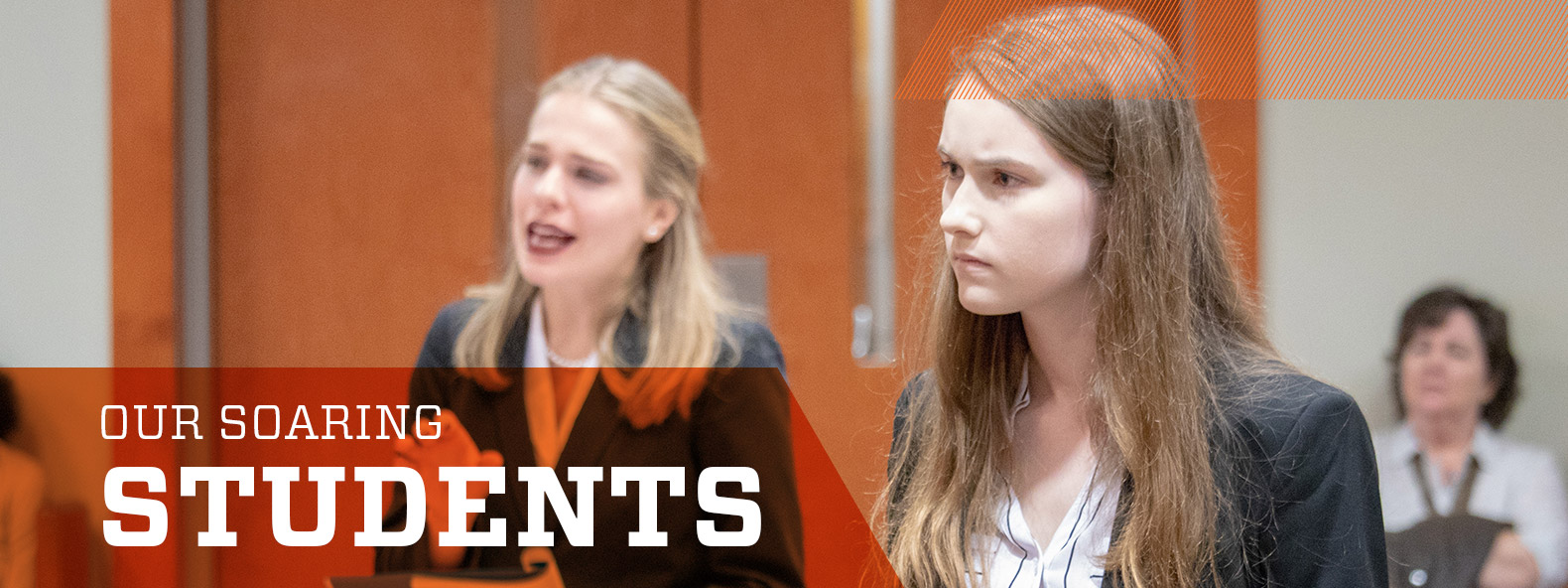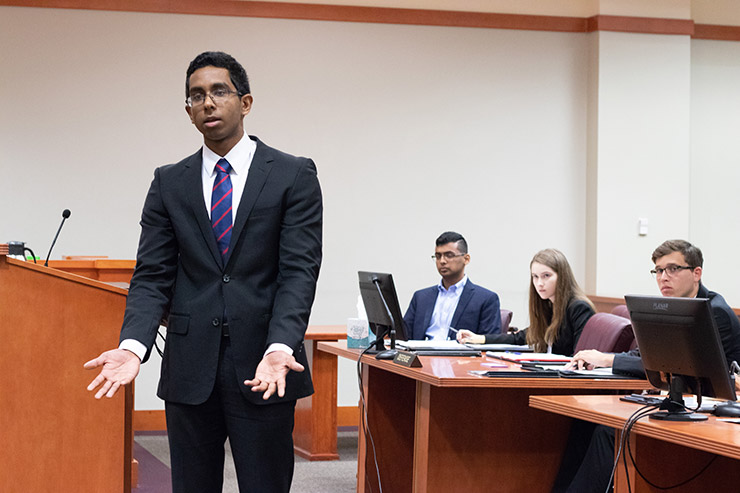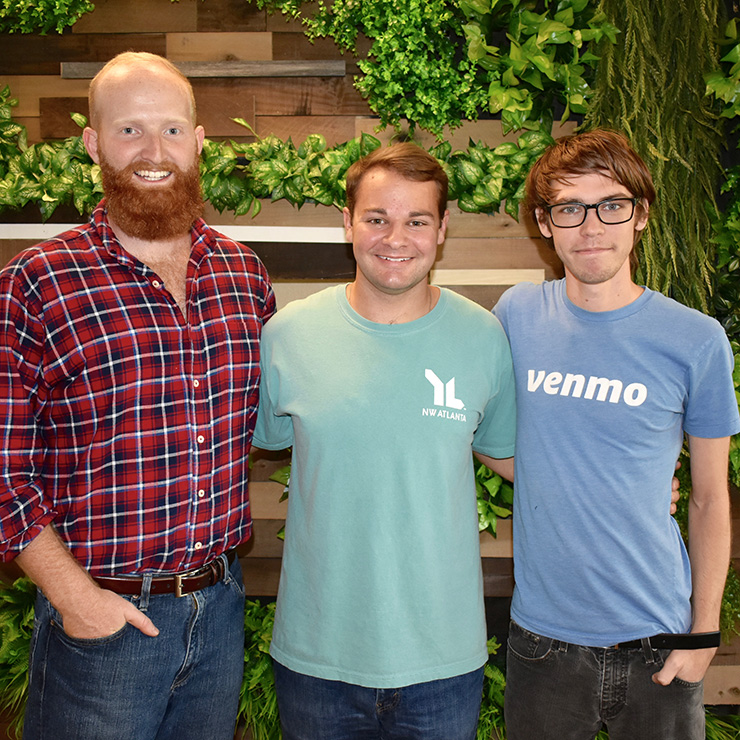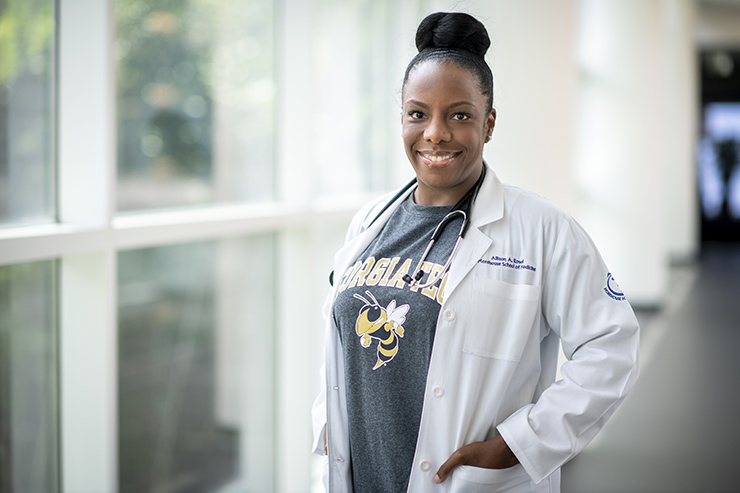
Annual Report 2019: Our Soaring Students
When it comes to Yellow Jackets’ accomplishments, the list is wide-ranging — from achievements such as superior academic milestones, to the invention of popular consumer products, and the initiation of first-time national community service efforts. With unending pride in our students, the Institute continues to refine its student support to ensure this continued trajectory of excellence.
Student Honors and Achievements

Mock Trial Team Makes History at Regionals
In February, Georgia Tech made mock trial history with all three of its teams, for the first time, notching bids to the Opening Round Championship Series of the American Mock Trial Association Tournament.
In Jackson, Mississippi, the A and B teams ranked second and seventh place, respectively. Two members of the A and B teams were named Outstanding Witnesses, while three others were named Outstanding Attorneys. The C team finished fifth at a different regional tournament in Orlando, Florida.
Sarah Jane Lowentritt, a civil engineering major and member of Mock Trial’s C team, said, “Getting 100% of our teams a bid at regionals shows how our program is getting stronger.” Noting that five of the C team’s nine members are first-year students, she said that this is a demonstration of “how [the team is] improving in both recruiting new members and helping new members improve throughout the year.”
Medical Device Wins 2019 Invention Competition
A device to help physicians guide needles into the spine accurately and safely won the 2019 grand InVenture Prize of $20,000, a free U.S. patent filing by Georgia Tech’s Office of Technology Licensing (valued at approximately $20,000), and automatic acceptance into CREATE-X’s Startup Launch program.
Two recent Tech biomedical engineering graduates, Dev Mandavia and Cassidy Wang, and mechanical engineering alumnus Lucas Muller teamed up to develop the medical device using ultrasound technology coupled with a custom-built guidance tool.
Mandavia, a 2017 InVenture Prize winner, said that the mission of his team, Ethos Medical, is “to get lumbar punctures placed successfully on the first try, every time.”
The team had been working full-time to launch the company since inventing the device on campus in 2018. They have also been working closely with Atlanta-area doctors to develop a prototype that medical professionals will use.
“The next step for us is to begin the FDA testing process,” said Wang.
The team called TremorTrainer placed second with its therapeutic weighted glove invented to help tremor sufferers regain some of their fine motor skills — especially for everyday tasks such as eating and writing.
The People’s Choice Award and $5,000 went to Nix for their e-cigarette device, custom-coded to taper, reduce, and ultimately eliminate nicotine intake.
Following their March win of the 11th rendition of Tech’s InVenture Prize, Ethos Medical also participated in the spinoffs of the original competition, travelling to North Carolina to face off against inventors from all 15 Atlantic Coast Conference universities at the 2019 ACC InVenture Prize. Additionally, they qualified as finalists in the inaugural Georgia InVenture Prize presented by the Georgia Chamber of Commerce.

Jackie Knee Named the 2019 Marshall Sherfield Fellow
As a Fulbright Fellow in rural Thailand, in the United States at the Centers for Disease Control and Prevention, and at Georgia Tech as a fifth-year Ph.D. student in environmental engineering, Jackie Knee has been singularly focused on making people healthier. Once she finishes her degree in late 2019, she’ll continue pursuing that mission in Britain as the 2019 Marshall Sherfield Fellow.
“The burden of infectious enteric disease is too high and disproportionately affects the most vulnerable worldwide — young children, the elderly, and the poor,” Knee said. “I have worked in the [water, sanitation, and hygiene] sector for over 10 years because I have seen the progress that has been made in terms of disease reductions, and I want to help ensure that progress continues.”
The Marshall Sherfield Fellowship offers one engineer or scientist from the United States the chance to do postdoctoral research in the United Kingdom for up to two years. Knee has proposed several new avenues of inquiry, including tracking microbial exposure risk in the food chain.
“The idea is to understand when, where, and how food becomes contaminated and to quantify exposure risks to consumers in Mozambique and Kenya,” said Knee, who works with the Carlton S. Wilder Assistant Professor in the School of Civil and Environmental Engineering Joe Brown. “These data will then be used to inform the design and implementation of an intervention aimed at decreasing exposure and health risks.”
Generally, Knee focuses on how pathogens in the environment get into people’s digestive tracts and make them sick. She also studies ways to limit that exposure, looking for the strategies that lead to the lowest human health risks.
Knee will work at the London School of Hygiene and Tropical Medicine (LSHTM), in part because it’s one of the world’s oldest and most respected schools of public health, but also because it offers her the chance to focus on new skills.
“I also hope to expand my background in epidemiology and biostatistics, and there are few better places in the world than LSHTM to learn and practice these skills,” she said.
At Tech, Knee has been working on a three-year evaluation of whether implementing improved sanitation services in Maputo, Mozambique, actually improves the health of young children in low-income neighborhoods.
Brown, her advisor, said Knee is the driving force behind the project.
“Jackie brings an impressive level of dedication and passion to her work, really inspiring all of us in my research group. Her Ph.D. work — where she has applied new approaches to measuring sanitation-related infectious disease — represents an outstanding contribution in terms of advancing our understanding of how infrastructure influences health outcomes among the world’s most vulnerable populations,” he said.

Student-Run Conference Unites Colleges on Mental Health
Georgia Tech’s first student-run mental health event, the Intercollegiate Mental Health Conference (IMHC), produced a 114-page document with over 70 best practices compiled from the input of peer institutions in attendance at the weekend-long event.
“The creation of a public best practices and policies database for college mental health is, as far as I’m aware, unprecedented,” said Collin Spencer, director of Georgia Tech’s Mental Health Student Coalition (MHSC).
Students and campus leaders from 10 universities, along with clinical practitioners, researchers, and mental health advocates, convened at the Georgia Tech Hotel and Conference Center and addressed one of the most pervasive issues in American higher education through panel and group discussions, case studies, lectures, and networking. This approach not only succeeded in bringing together a wide cross-section of stakeholders for direct interaction, but also resulted in the creation of a publicly accessible best practices repository and a shareable database of successful college mental health programs.
“My hope is that we will be able to learn from what other universities have tried and adapt the strategies that have proven successful on other campuses,” said John Stein, vice president for Student Life and the Brandt-Fritz Dean of Students Chair.
The MHSC first proposed the concept in 2018, and it was quickly embraced by the Student Government Association, Office of the President, Division of Student Life, the Counseling Center, and the Georgia Tech Research Institute. Additionally, Georgia’s Department of Behavioral Health and Developmental Disabilities, the National Alliance on Mental Illness, and the Carter Center lent their support.

FIXD Makes Multiple Innovative Gadgets Lists

John Gattuso (center), CEO and co-founder of FIXD, with COO Frederick Grimm (left) and CTO Julian Knight (right).
FIXD is a stellar example of the startup success that comes out of Georgia Tech. It appeared in the No. 1 spot on the State of Gadgets list of “17 Genius Tech Gadgets Already Selling Out In 2018” as well as on My Smart Gadgets’ list of 19 “Insanely Cool Gadgets.” FIXD also featured in Money Inc.’s “20 Cool Gadgets to Make Life Easier in 2018.”
The brainchild of a team of Yellow Jackets with backgrounds in mechanical and biomedical engineering, and computer science, FIXD is a device for affordably monitoring car health and maintenance.
Five years ago, then undergraduates Rachel Ford and John Gattuso, and recently graduated Kevin Miron, began working on the sensor. The work was part of the newly introduced Startup Lab designed to teach students to channel their ideas into startups, covering everything from customer discovery to creating sustainable businesses. Later on, a fourth student, Rikin Marfatia, joined the team.
The team was one of eight that also completed Startup Summer, a 12-week Georgia Tech internship for students wanting to launch startups based on their own inventions and prototypes.
Four Yellow Jackets Named Goldwater Scholars
Four Tech students were awarded the scholarship named to honor the late Senator Barry Goldwater. The prestigious award was given to 496 college sophomores and juniors out of an estimated 5,000 applicants for the 2019–20 academic year.
With the recipients awarded up to $7,500 each, the scholarship is intended to help them continue their education and pursue a research career in the natural sciences, mathematics, or engineering. Those selected at the end of their second year receive two years of funding; those selected in their third year receive one.
Sherry Sarkar, a computer science major, was selected in the field of computer and information sciences and engineering. She plans to earn a Ph.D. at the intersection of computer science and mathematics, working in academia and developing her passion for teaching.
Lee-Kai Sun, a biomedical engineering major, plans to pursue an M.D./Ph.D. in immunology or biomedical engineering. Sun wants to find new strategies for rewiring the immune system in the treatment of refractory diseases.
Eleanor “Lily” Turaski, a materials science and engineering major, was selected for her interest in materials research. She plans to obtain a Ph.D. in materials science and engineering, with a focus on electronic materials and designing more efficient solar cell technology. She also wants to teach as a university professor.
Julia Woodall, also a biomedical engineering major, is motivated by her interest in the power of physics in disease. She ultimately wants to work in academia to develop mechanical models of living systems at the cellular and systems levels.
New Student Resources
New Student Resources

Phase I Construction of Campus Center Project Underway
Four new buildings that promise to dramatically enhance campus will come out of the renovations of Georgia Tech’s Student Center.
Dubbed the Campus Center project, the phased undertaking will encompass a 15-acre site from the Campus Recreation Center to the Clough Undergraduate Learning Commons. The outdoor space between buildings will be punctuated by a series of walkways, plazas, and opportunities for social, creative, intellectual, and restorative engagement.
To minimize disruption to the campus community and help ensure continuity of services, construction is being undertaken in two phases. Completion of the entire Campus Center project is expected in late 2022.
Phase I of the construction project focuses on the development of the four new buildings: an exhibition hall, two pavilions, and a standalone café.
When Phase I of the project is complete, the new exhibition hall and pavilions will provide temporary space for the Student Center’s critical functions, such as dining, mail services, student organizations, and retail, during Phase II construction. Phase II, renovation of the existing Student Center building, is expected to last from Summer 2020 through late 2022.

Campus Creates Gender-Inclusive Single-Occupant Restrooms
More than 150 single-occupant, gender-inclusive restrooms have been designated in 63 buildings, including in housing and athletic facilities, on Tech’s campus.
“This step represents continued progress toward creating more open and welcoming campus facilities that are useful for every member of our community,” said Jennifer Hubert, interim associate vice president, Institute Planning and Resource Management.
In addition to the restroom conversions and new signage installations, Tech is also updating the online campus map to reflect the location of these restrooms. Moving forward, Georgia Tech will review campus needs for additional gender- inclusive restrooms as buildings are renovated or constructed.
New Cybersecurity Master’s Degree Offered Online for Less Than $10,000
Georgia Tech, in collaboration with edX, has launched a new online cybersecurity master’s degree that’s being offered for less than $10,000.
The Online Master of Science in Cybersecurity (OMS Cybersecurity), an interdisciplinary collaboration between the School of Computer Science, the School of Public Policy, and the School of Electrical and Computer Engineering, is designed to address a severe global workforce shortage in the field. According to the 2017 Global Information Security Workforce Study, the shortage is expected to reach 1.8 million people by 2022.
Georgia Tech is the only nationally ranked top-10 university to offer such a program at a tuition rate intended to increase accessibility and affordability. The degree has been offered on campus since 2002.
OMS Cybersecurity is Tech’s third at-scale online degree program. It follows the same model as the groundbreaking Online Master of Science in Computer Science (OMSCS) program, which launched in 2014 and has enrolled approximately 10,000 students overall. Tech followed that success in 2017 with the Online Master of Science in Analytics.

College of Business and Morehouse School of Medicine Partnership Offers M.D./MBA Program

Allison Rowell is on track to graduate from the M.D./MBA program in 2020.
Tech’s Scheller College of Business and Morehouse School of Medicine have partnered to offer an M.D./MBA program. Students complete their first three years as medical students at Morehouse before entering the Scheller College of Business for a rigorous one-year MBA program. The final year, students return to Morehouse to complete their fourth year of medical studies.
By offering this dual degree, Morehouse and the Scheller College are preparing students to provide high-quality health care in a smart, efficient way.
“Tomorrow’s physician must be business-savvy, possess a lot of financial and managerial acumen, and also be entrepreneurial in their mindset. Our curriculum not only develops managerial and financial acumen, but also develops tech-savvy and entrepreneurial thinking. This combination of skills enables our M.D./MBA students to thrive and excel as physicians,” said Scheller College Dean Maryam Alavi.
Georgia Tech Introduces Only Graduate Degree in Georgia Dedicated to Sustainability
Georgia Tech recently launched the only graduate degree in the state fully dedicated to sustainability issues: the Master of Sustainable Energy and Environmental Management (MSEEM).
The highly technical, science-based, and interdisciplinary program was approved by the University System of Georgia’s Board of Regents in February. It will prepare students to deliver fact-based policy expertise through robust analytical techniques and a deep understanding of energy and environmental issues and sustainability practices. MSEEM students will study topics such as sustainable energy and voluntary environmental commitments, utility regulation and policy, Earth systems, economics of environmental policy, big data and policy analytics, climate policy, and environmental management. They will also learn analytical techniques used to estimate and evaluate sustainability metrics, be able to expertly assess the context of energy and environmental problems, and understand environmental ethics and its implications for sustainability practice.
The program will combine professional instruction from the nationally ranked School of Public Policy with Georgia Tech’s top-notch engineering, business, and planning faculties.
Students can complete the degree on campus or online as full-time students. They also have the option to enroll part-time and complete the degree online.
In addition to the master’s degree, Tech is also offering a Certificate in Sustainable Energy and Environmental Management, which can be completed in one or two semesters and can be earned separately or in combination with the master’s degree.
(text and background only visible when logged in)

